I didn't want to hear what she said and suddenly she couldn't anymore.
First she lost the vision from her eyes, then her ability to speak. It was my turn to tell stories to her.
I always wondered why she didn't want to visit Carelia. It came possible to make short journeys there around 1990, but
she didn't want to and I couldn't understand why, because that was clearly what she had always wanted to do; to go back.
Well, she was 80 and I was 18.
Last year we buried her and I made my first journey to Russia. I packed myself into the bus full of cheerful pensioners and crossed the border to history.
At first, the tiny historian in me was overwhelmingly excited. It was like I had jumped back to the 30's.
The bus went along the bumpy roads. Grey houses on the endless fields. Women washing their clothes outside, in the sunshine. Small children feeding hen.
Cows, geese and goats standing across the sandy roads. When we stepped outside from the bus, I smelled a mixed scent of the sea, roses, lilacs and dust. I thought it was just like it had been earlier, but when I walked in the village I noticed everything had changed.
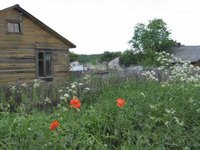
The houses my ancestors lived in were burned, but the houses built after that were in poor condition.
I saw burnt wood, broken tiles, old log houses painted in turquoise, backyards full of broken cars. I saw rose bushes and flowers growing alone in the fields, marking the places where my relatives lived.
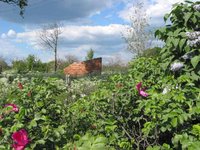
I had a lousy map with me and I tried to find the exact place where
she once lived. I was looking for the trees standing on the beach, but there were no such trees anymore. I walked and walked, but couldn't find anything. I was standing in the middle of some poor farmer's stamped field. Looking for what? A piece of glass from the window?
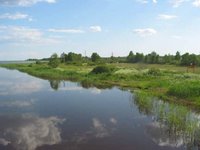
I took a photo of the place. It's just a field near the sea. I don't know what I was searching for. If there hadn't been the war, maybe I would live somewhere there. Or maybe not. I would had moved away. My Mum wouldn't have been born in the train and she probably wouldn't have met my Dad. I wouldn't exist at all.
I saw so much beauty. I saw so much poorness. I visited Terijoki and saw the remains of the old villas on the beach. The broken statues behind the wild bushes. The posh new houses near the beach. The closed doors to the posh beach Hotels with swimming pools. The tiny art historian in me wept and listened to the ghosts. I walked on the empty beach. It is something I had never seen before.
The Northern Riviera. Trust me, it was once. I walked in the low water until I was told not to do so. There aren't any swimmers left.
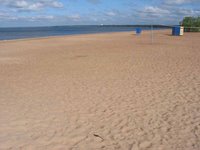
I realized why she wouldn't want to see that. She had a beautiful vision of eternal summer in her head.
She wouldn't have wanted to see what was standing on the place where once was a school.
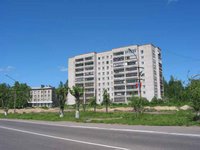
She wouldn't have wanted to see what was standing on the place where the ships were once built.

She wouldn't have wanted to see the happy children bouncing outside the village cinema, what once was the new mighty church.
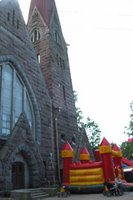
I looked at the happy kids bouncing. I tried not to think what a masterpiece of architecture was ruined behind the happy kids, who suddenly stared at the silently crying old people.
It was both intriguing and shameful. What was I doing there, staring at their lives?
All these years I had thought what would happen if we could have it back. If it would be possible, we would take their homes and lands. The children didn't know. Their parents and maybe grandparents were born there. It was their home now.



6 comments:
Your writing is beautiful. Thank you for sharing this.
You're welcome. I'm glad if you liked it.
I saw the comment above and decided I should read this again (for about the fourth time) with the Karelia Suite playing before commenting. I've got to the Ballade movement. I can see what IP means. Now the two will be inextricably linked in my head.
You're a wonderful writer, Taiga.
Now you are far too kind, seriously :)
I find the pictures of the wooden houses and overgrown gardens very evocative. It is almost as if there is a desire not to build again or re-inhabit a place after the people who lived there died. In England there is such a desperation for new houses that such sites would have been flattened almost immediately and then built upon.
Nobody seems to like building ships anymore. All of the yards that I knew and collected ships from are closed down now.
Your post was a good memorial for your granny, I enjoyed reading it.
Thanks S-C.
In that part of the village where my Granny lived, almost all the scenery was like that. Nothing new. It was somehow very beautiful, sad and haunted at the same time.
Near the church were some horrible Soviet-time buildings, but they were in very bad condition too. In my humble opinion everything like that should be flattened down immediately...
The Primorsk oil port, which is in the picture (which isn't taken by me btw.), will definitely change the whole area soon. I'd really like to visit that place again before it's too late.
The contrast between the extreme richness and poorness was quite striking everywhere, but especially around Terijoki, where the millionaires have built their shiny luxury-houses.
The ships were really important to my Granny. Quite many of my ancestors were sailors, actually. Maybe there's one reason for my occasional restlessness :)
Post a Comment